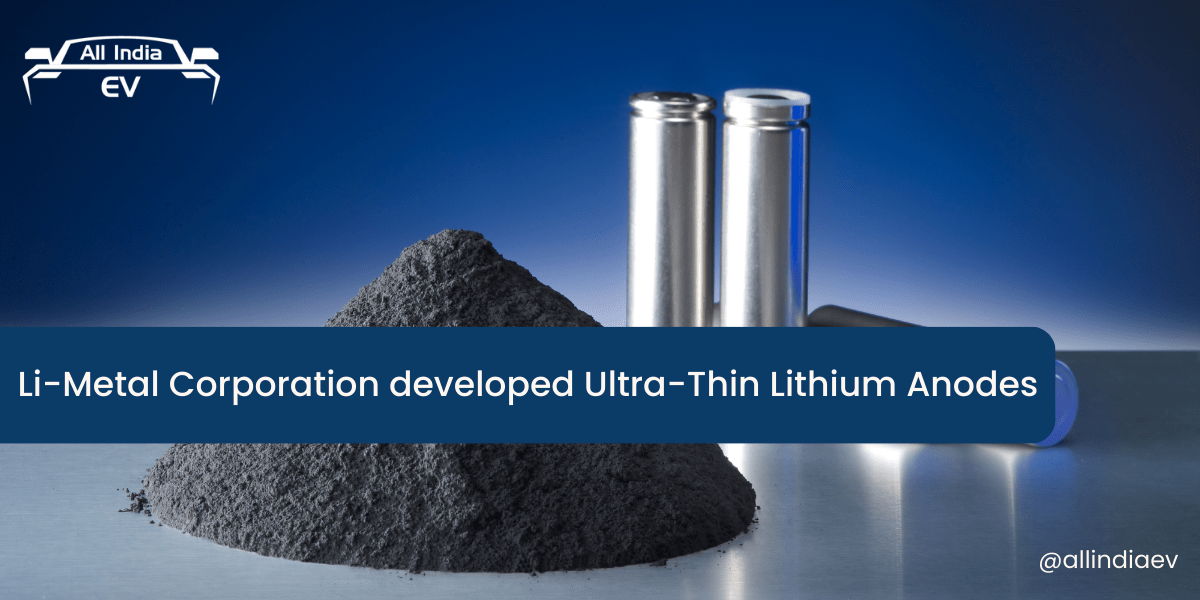
Li-Metal Corporation Revolutionizes Battery Technology with Breakthrough Ultra-Thin Lithium Anodes
In a significant advancement for the battery industry, Li-Metal Corporation has unveiled its ultra-thin lithium on metalized polymer anodes, marking a new era in lithium battery technology.
This innovation, developed at their advanced anode pilot plant in Rochester, New York, is part of a larger global effort to enhance lithium battery performance through innovative anode materials.
Li-Metal is pleased to advance our second-generation anode products with the successful production of our Gen2 lithium on polymer and metalized polymer anode products using our roll-to-roll PVD technology.
Srini Godavarthy, Li-Metal’s CEO
“We believe we are one of the only next-generation anode technology developers to successfully produce these lithium metal anode products using PVD technology, which marks another key technological process breakthrough for our company. Through the production of our second-generation products, the Li-Metal team has enhanced the productivity of our PVD machines, optimized raw material costs and established a pathway to cost-effective commercial-scale anode production. We look forward to leveraging our second-generation products to accelerate the adoption of cost-effective ultra-thin metal anodes into the e-mobility and eVTOL markets.
Around the world, research and development in anode materials for lithium batteries are gaining momentum, driven by the growing demand for higher energy density, longer life, and safer batteries. Researchers and companies globally are exploring various materials and technologies to replace traditional graphite anodes, which have limitations in energy capacity and charging speeds.
One of the most promising areas of research is the use of silicon in anodes. Silicon has a much higher capacity for lithium compared to graphite, potentially offering a significant increase in battery capacity. However, silicon anodes face challenges such as large volume expansion during charging, which can lead to rapid degradation. Researchers are actively developing composite materials and innovative designs to mitigate these issues.
Graphene, another material, is also being investigated for its exceptional conductivity and mechanical strength. Graphene-based anodes can improve battery life and charge rates. Companies are exploring ways to integrate graphene with other materials to harness its benefits while overcoming its limitations.
Additionally, solid-state batteries, which replace the liquid electrolyte with a solid electrolyte, are also seen as the future of lithium batteries. They promise higher safety and energy density, with many companies and research institutions investing heavily in this technology. The anode materials in these batteries are critical to their performance and longevity.
Back to Li-Metal’s breakthrough, their second-generation anode technology not only reduces reliance on copper, cutting costs and weight but also offers improved energy densities – a leap forward in battery technology. With this innovation, Li-Metal is positioning itself at the forefront of the global race to develop more efficient, sustainable, and high-performing lithium batteries.
As the battery industry continues to evolve, the focus on anode materials will remain crucial. With companies like Li-Metal leading the charge, the future of lithium batteries looks more promising than ever, paving the way for advancements in electric vehicles, renewable energy storage, and beyond.
EV Market Insights with All India EV
Companies that are working on anode R&D for lithium batteries are:
Epsilon Advanced Materials Pvt, a manufacturer of synthetic graphite anode materials in India, aims to produce 100,000 tonnes of anode precursor by 2030.
QuantumScape, a US-based company that is developing solid-state lithium-metal batteries with a ceramic separator and a lithium-metal anode.
PyroGenesis Canada, a Canadian company that is collaborating with HPQ Silicon Resources and INRS to develop silicon-based anode materials for lithium-ion batteries.
Sionic Energy, a US-based company that is developing silicon-graphite composite anodes with patented coating technology.
ProLogium, a Taiwan-based company that is developing solid-state lithium-ceramic batteries with a bi-polar cell design and a lithium-metal anode
